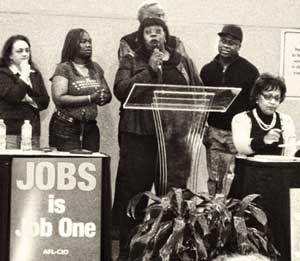10 years after victory
Dockworkers gather to honor Charleston 5
By
Dante Strobino
Charleston, S.C.
Published Mar 5, 2010 10:00 PM
More than 100 dockworkers, joined by close to another 100 unionists and
community activists, gathered in Charleston on Feb. 27-28 to commemorate the
10th anniversary of the Charleston 5 victory. The dockworkers, four Black and
one white, most of them members of the International Longshoremen’s Association
Local 1422, had been attacked by police riding on horses, in armored cars and
in helicopters while picketing a non-union ship. They were jailed on
“riot” charges but later freed after a long struggle.
|
Janie Campbell, Charleston sanitation worker and acting president of AFSCME
Local 1199, speaks about their efforts to win union recognition. Standing,
right, is President Ken Riley of ILA Local 1422, one of the Charleston 5.
Sitting, right, is Arlene Holt Baker, executive vice president of the AFL-CIO.
|
The activity brought together dockworkers from around the world and ILA
members from ports up and down the East Coast, plus members of International
Longshore and Warehouse Union Local 10 on the West Coast.
Charleston sanitation workers, who are currently in a struggle to unionize,
also participated.
Ken Riley, president of ILA Local 1422, spoke on the significance of the Charleston 5 victory. He said it’s important not
to forget the union’s struggles and to embrace the support of union
members from elsewhere, especially as South Carolina is a
“right-to-work” state that continues its assault on the right of
workers to form unions.
South Carolina’s anti-worker politicians are currently proposing a state
constitutional amendment, HR 3305, that would prevent unions from being able to
use card-check neutrality, stated Donna Dewitt, president of the state AFL-CIO.
This is one of the major aspects of the Employee Free Choice Act that workers
are currently fighting to get passed by Congress.
South Carolina is also taking measures to undermine the independence of the
Employment Security Commission by folding it into the governor’s office
— a move that would further erode workers’ likelihood of receiving
decent unemployment insurance.
While workers and their organizations are under attack all over the country,
they are especially hard hit in the South. In North Carolina, many of the few
remaining tobacco plants are scheduled to close soon. Public sector workers in
North Carolina and Virginia are still in a long battle to overturn Jim Crow
laws that ban collective bargaining.
This situation, in large part, goes back to the inability of trade unions to
properly address racism. “The starting point of building unions in the
South isn’t building unions necessarily — it is addressing the
actual conditions faced by workers, like discrimination,” stated Saladin
Muhammad, long-time union organizer in the South and a member of Black Workers
for Justice.
“In all 12 Southern states, there are fewer union members combined than
there are in the state of New York alone,” he continued. Muhammad then
called for independent organizing of workers outside the trade union movement.
“During the Great Depression of the 1930s, workers didn’t first
build unions, they often just built committees,” claimed Muhammad.
“We must build a Southern alliance to organize the South.”
AFL-CIO launches campaign for jobs
The national AFL-CIO took advantage of this important gathering and placed it
in the current context of mass unemployment. It hosted a Town Hall meeting in
Charleston to announce its Jobs with Rights Now campaign. Simultaneous Town
Hall jobs meetings were held in four other U.S. cities. Arlene Holt Baker,
executive vice president of the AFL-CIO, was the keynote speaker at the
Charleston event. Speaking of the jobless crisis, she said that “9.7
percent unemployment doesn’t even begin to tell the truth. ... The real
numbers are astronomical.”
Holt Baker commented on the paltry jobs bill recently passed by Congress.
“We applaud that,” she said, but it is “not big enough and
bold enough to put millions of workers back to work.” She continued,
“We got to be bold. ... We must even be willing to go to the streets and
go to jail” to win jobs.
The only path to true economic recovery is if workers and communities continue
to unite and challenge the direction of the U.S. government, which will bail
out the banks and fund the wars while more than 27 million people remain
unemployed and underemployed.
Unless a broad fightback grows, the state budgets will continue to get slashed,
creating the justification for continued attacks on social services and the
right of workers to organize unions. The struggle must continue to demand a
federally funded public jobs program that includes workers’ power and
living wages on the scale of the Works Progress Administration that workers and
the unemployed won in the 1930s.
Articles copyright 1995-2012 Workers World.
Verbatim copying and distribution of this entire article is permitted in any medium without royalty provided this notice is preserved.
Workers World, 55 W. 17 St., NY, NY 10011
Email:
[email protected]
Subscribe
[email protected]
Support independent news
DONATE


